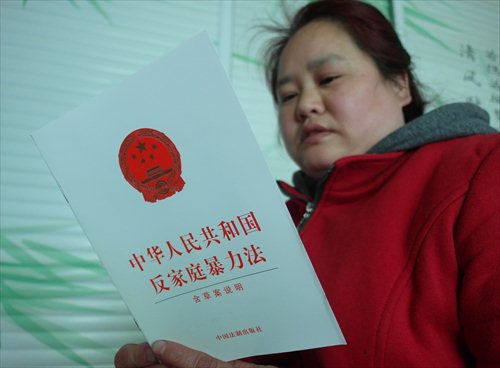HOME >> METRO SHANGHAI
Battling brutality in the home
Source:Global Times Published: 2016-3-6 17:33:01
China passes laws clamping down on domestic violence

Shanghai Women's Federation reports that 31.35 percent of the callers to its hotline are aged between 26 and 45. Photo: IC
China's first domestic violence laws came into effect after being approved at the Standing Committee of the National People's Congress late last year. Under the new law, domestic violence is defined as physical or psychological harm inflicted by family members and includes assaults, restraints, hurting or restricting someone's liberty, or verbal threats or abuse.
Recently, the Shanghai Municipal Women and Children Committee and the Shanghai Women's Federation held a forum in Shanghai, to look at the new law and discuss a survey on domestic violence in the city.
According to the survey the number of complaints about domestic violence reported to the police has been declining annually. In 2012 there were 6,494 calls citywide to the police emergency hotline, in 2013 there were 5,426, and in 2015, 4,971. In contrast, the women's federation hotline received 282 calls in 2013, 243 in 2014 and 440 last year.
The reason for the discrepancy in the figures is that when a victim is being assaulted they try to call police for help first. The calls to the federation hotline were mostly from women who had once been abused and wanted advice on separation and divorce or counseling.
Conventional notion
According to the Women's Federation 31.35 percent of the callers to its hotline were aged between 26 and 45. The conventional notion in China that "domestic violence was caused by generally uneducated people with a low level of sophistication" was upturned - 22.43 percent of domestic violence victims had a bachelor's degree while more than 21 percent had received junior and middle school education. Five percent of the cases involved unmarried, divorced or separated partners.
Experts agree that domestic violence generally has distinct hallmarks as a crime: 89 percent of the cases involved males abusing females with just 0.74 percent involving females abusing males. Some 2 percent involved assaults on children and 2.7 percent involved elderly people. The figures showed that 86 percent of the cases resulted in physical violence. In these incidents 69 percent of the victims were left injured.
Some recent domestic violence cases in Shanghai have had tragic outcomes. In 2014, a woman in Chongming county killed her husband with a hammer after she had endured years of violence at the hands of her partner. At the trial, the court accepted the "battered woman syndrome" premise raised by the women's federation and sentenced her to just four years in prison. In this case, apparently, the victim lacked any way of defending herself and did not know how to seek help from her predicament.
In 2015 in Pudong, another woman, surnamed Qing, had a hand chopped off by her husband. This case attracted a lot of publicity and the story went viral on social media. Because the woman was from outside the city, she lacked support from relatives or friends.
Before her husband attacked her in that way she had repeatedly asked for help from neighbors and passers-by when he was assaulting her. But no one came to her aid, arguing that this was a family conflict and not something outsiders should be involved in. With legal aid, counseling and other assistance from the Shanghai Women's Federation, Qing has largely rehabilitated herself and is regaining her self-confidence.

A woman reads through China's first domestic violence laws which came into effect on March 1. Photo: IC
In the frontline
Schools are now also in the frontline of the fight against domestic violence. In 2015 an alert teacher spotted bruises and scars on a young student's body and reported this to the police immediately. The mother, surnamed Wang, was charged with assaulting her child and, in the end, was sentenced to probation for two years. An officer with the Shanghai Municipal Women and Children Committee said he regularly faced all sorts of difficulties and problems when dealing with domestic violence cases.
First of all, the official said, the officiating departments and society in general lacked awareness about gender and domestic violence. The traditional thinking that "domestic violence is a family matter," is deeply rooted and this can delay the detection and intervention of violent behavior, and directly influence cases.
Second, work in the past had lacked foundation in law and regulatory authority. Before the domestic violence laws took effect, there had been arguments about how "domestic violence" should be defined. Along with this the police and courts had no effective restraints. So when domestic violence occurred, all they really could do was verbally persuade offenders.
Then the actual responsibilities of the various relevant departments were never clarified and, as a result, any cooperation was short-lived and not formal. Third, there was no standard for collecting statistics, which made it difficult to assess the overall situation and provide the services needed.
As well, some of the old assessment criteria were unreasonable, so even if there was actual domestic violence, the relevant departments were reluctant to deal with single cases and assessments and write-ups were often delayed.
Domestic violence is a global concern. In recent years, many foreign countries have explored new measures to reduce domestic violence and stop it damaging society. Although China now has a distinct law for domestic violence there is always room for improvement.
Evicting abusers
In Germany the law on domestic violence established an important principle that "an abuser must be kept out of the home" - convicted offenders are evicted and not allowed to approach the home or the victims. If there is domestic violence reported the German police have the right to evict the troublemaker and confiscate his keys to the home.
The British government has a program that offers people the right to information about someone who may have a record of domestic violence in the past. Individuals can inquire whether their partners or family members have violent tendencies. If violent behavior is discovered, police can inform the person inquiring.
In the Netherlands it had been estimated in the past that only 20 percent of victims reported domestic violence to the police and asked for help - the other 80 percent never reported their situation.
In 2013 the Netherlands changed the law from the old "no complaint, no investigation" attitude. The new law means people involved in education, healthcare, childcare, social work and professionals in the criminal justice system are obliged to report suspicions of domestic violence. Public servants like police officers who are convicted of domestic violence charges can face double the normal penalties.
Compiled by the Global Times based on a Youth Daily report
Posted in: Metro Shanghai, City Panorama